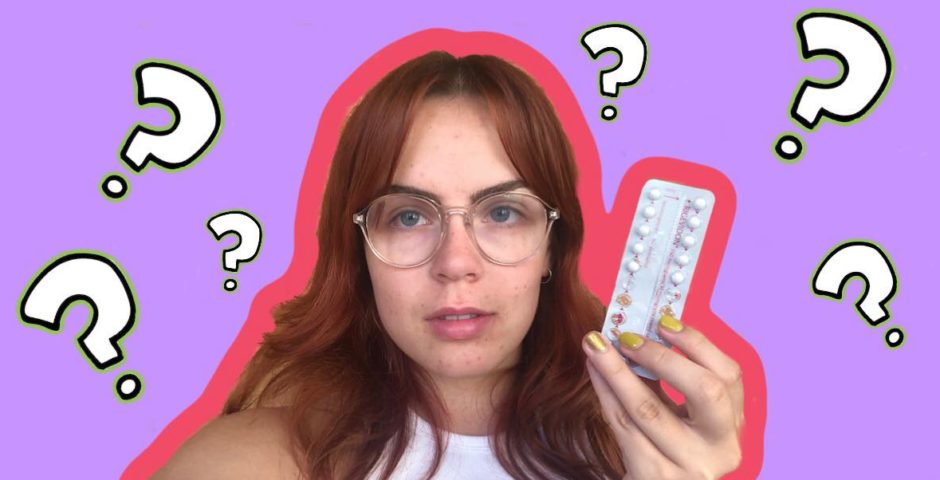
Everything girls should be told about the pill, but simply aren’t
If you feel like a different person the pill might be to blame
The pill is seen by many as a Godsend. Since its introduction in the 60s, it has been held responsible for the sexual liberation of so many women.
Obviously, the pill has many positives. It regulates and lightens periods, helps treat PCOS and endometriosis, helps tackle cramps and generally balances hormones. Or so we’re told…
The pill actually has a host of dark side effects, which are rarely discussed, even in the doctor’s office. Since comparing blood clot risks between the Astra Zeneca vaccine and the contraceptive pill, lesser-known side effects are gradually becoming pieces of mainstream knowledge. The unfortunate truth is that we’re not even scratching the surface of what girls should be aware of before taking the pill.
The pill can cause or worsen hair loss
To understand how this happens, it’s important to appreciate that hair growth works in cycles with three phases – the active, transitional and resting phases. The resting phase (during which hair doesn’t grow) should only last up to 100 days, but taking the pill can cause the cycle to progress from the active to the resting phase too quickly and stay in that phase for much longer.
This is especially worrying of baldness already runs in your family. What’s worse? The same is true for any hormonal birth control method.

The oestrogen in birth control pills can help yeast to grow
It’s no secret that birth control pills affect the natural balance of hormones in your body. It is also believed that taking the pill causes your vagina to produce more sugars. What does this mean? The pill feeds the yeast!
Because yeast already lives in the vagina, this causes overgrowth and pretty uncomfortable yeast infections.
Migraine sufferers should take the progestogen-only pill
Migraine sufferers should be very careful about which pill they choose to take; for some of them, taking the combined pill can come alongside an increased risk of strokes, especially when having a family history of high blood pressure and heart disease.
For others who find their migraines are associated with PMS, taking the pill can reduce symptoms before your period. But Migraine Trust also reported that during the week off the pill, after 21 days on, migraine attacks are much more frequent and painful.

The pill contains hormones that influence mood
The combined pill contains progesterone and oestrogen, the latter of which can cause especially noticeable mood fluctuations. This leads to an increased chance of suffering from anxiety or depression whilst on the pill.
TED described the experience of some women as “feeling like a different person” or feeling “crazy”. As a result, most women who stop taking the pill within a year find the side effects “intolerable” find the side effects related to their moods. Because of the massive influence of female sex hormones on multiple areas of the brain, this can be anxiety, depression, or both at once.
Be prepared for breakthrough bleeding at the beginning
Although breakthrough bleeding is most common when taking continuous birth control, such as the mini-pill, it is still a highly reported side effect when taking combined birth control pills.
In 2016 PubMed central reported that 30-50 per cent of combined pill users experienced breakthrough bleeding in the first six months. But breakthrough bleeding can also occur for many other reasons, including missing a dose, taking a new medication or smoking.
Smoking on the pill can create further and more serious issues, including increased risks of heart attacks or strokes.
The pill can also affect your gut health (gut dysbiosis)
The pill isn’t the only type of medication to upset your gut health. The same could be said of antibiotics, for example. But the scariest part is how long term these effects can be – we’re talking years.
It has been found that the pill could have links to unresolved digestive issues or weight-loss resistance. NutritionWired describes these issues as being caused by the pill’s effect on both oestrogen metabolism and gut flora. Studies have linked birth control to an increased risk of both Crohn’s Disease and Ulcerative Colitis and causing women to be more susceptible to leaky gut.
Because leaky gut can present itself discreetly by causing more common symptoms such as acne or acid reflux, girls on the pill may remain completely oblivious to more serious thyroid issues or IBS.
Nobody talks about post-pill acne
The pill’s ability to make hormones fluctuate can also cause oily skin and acne. This is despite the fact it is often prescribed precisely as a fix-all acne remedy. The pill contains what can be understood as sebum-suppressing drugs, but what goes undiscussed is what happens when the body experiences withdrawal from these drugs after coming off the pill. This is what causes post-pill acne outbreaks.
Pill withdrawal can also result in a surge of male hormones in your body as your ovaries return to their normal function. Many people experiencing this post-pill hormone surge are often wrongly diagnosed with PCOS.
Be aware of the potential for mineral deficiencies
Another obscure symptom of being on the pill is its ability to cause essential vitamins and minerals deficiencies. Those at risk form a vast list including magnesium, folic acid, zinc, vitamin C, and B6 and B12. Although deficiencies don’t necessarily cause serious health risks, they are especially significant in the birth control realm because B vitamins, in particular, are needed for fertility.
Related stories recommended by this writer:
• An honest guide to everything about the pill before you start taking it
• As we’re talking about blood clots, where is the government’s energy to improve the pill?





















